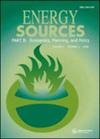利用多标准决策分析和Tobit回归模型对欧盟国家的能源效率决定因素进行了研究
IF 2.2
4区 工程技术
Q3 ENERGY & FUELS
Energy Sources Part B-Economics Planning and Policy
Pub Date : 2023-07-20
DOI:10.1080/15567249.2023.2233968
引用次数: 0
摘要
本文章由计算机程序翻译,如有差异,请以英文原文为准。
Investigating the energy efficiency determinants in EU countries by using multi-criteria decision analysis and the Tobit regression model
ABSTRACT This study investigates the effects of several contextual variables, including renewable energy intensity, capital stock per labor, natural resource rent, the share of imported energy in total energy consumption, the ratio of carbon emissions to GDP, population, and energy production on energy efficiency in EU countries. While Tobit regression is used to examine the effects of contextual variables on energy efficiency, Data Envelopment Analysis (DEA), Slack-Based Data Envelopment Analysis (SBM-DEA), and Technique for Order of Preference by Similarity to the Ideal Solution (TOPSIS) are used to calculate energy efficiency values of countries. Four different Tobit regression models are estimated as a function of the censored value for the energy efficiency series. The results show that renewable energy intensity, the ratio of carbon emissions to GDP, and population size have negative effects on energy efficiency. In contrast, regardless of the efficiency level, the share of imported energy in total energy consumption, total energy production, capital stock per labor, and technological progress have positive effects on energy efficiency.
求助全文
通过发布文献求助,成功后即可免费获取论文全文。
去求助
来源期刊

Energy Sources Part B-Economics Planning and Policy
ENERGY & FUELS-
CiteScore
6.80
自引率
12.80%
发文量
42
审稿时长
6-12 weeks
期刊介绍:
12 issues per year
Abstracted and/or indexed in: Applied Science & Technology Index; API Abstracts/Literature; Automatic Subject Index Citation; BIOSIS Previews; Cabell’s Directory of Publishing Opportunities in Economics and Finance; Chemical Abstracts; CSA Aquatic Science & Fisheries Abstracts; CSA Environmental Sciences & Pollution Management Database; CSA Pollution Abstracts; Current Contents/Engineering, Technology & Applied Sciences; Directory of Industry Data Sources; Economic Abstracts; Electrical and Electronics Abstracts; Energy Information Abstracts; Energy Research Abstracts; Engineering Index Monthly; Environmental Abstracts; Environmental Periodicals Bibliography (EPB); International Abstracts in Operations Research; Operations/Research/Management Science Abstracts; Petroleum Abstracts; Physikalische Berichte; and Science Citation Index.
Taylor & Francis make every effort to ensure the accuracy of all the information (the "Content") contained in our publications. However, Taylor & Francis, our agents, and our licensors make no representations or warranties whatsoever as to the accuracy, completeness, or suitability for any purpose of the Content. Any opinions and views expressed in this publication are the opinions and views of the authors, and are not the views of or endorsed by Taylor & Francis. The accuracy of the Content should not be relied upon and should be independently verified with primary sources of information. Taylor & Francis shall not be liable for any losses, actions, claims, proceedings, demands, costs, expenses, damages, and other liabilities whatsoever or howsoever caused arising directly or indirectly in connection with, in relation to, or arising out of the use of the Content. Terms & Conditions of access and use can be found at http://www.tandfonline.com/page/terms-and-conditions .
 求助内容:
求助内容: 应助结果提醒方式:
应助结果提醒方式:


